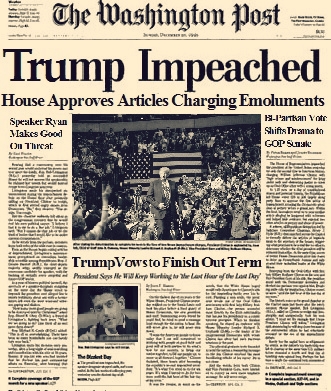I recently noted the publication of Nebraska Senator Ben Sasse’s book, Them: Why We Hate Each Other and How to Heal. The conservative publication, The Weekly Standard, summarized the main point of the book (my emphasis):
Many of the seemingly insoluble troubles afflicting Americans, Sasse thinks, stem from the decline in voluntary associations—or, to use the modern term, mediating institutions: the families and societies and associations and churches and synagogues that traditionally kept Americans together. The family unit has fractured. An overwhelming majority of children are born out of wedlock. Church attendance has cratered. Friendships, with technology and increased mobility, have fragmented. Politics has become the center of life instead of family, church, sports, or clubs. These associations and institutions once mediated between citizen and citizen, and citizen and government, and all at lower stakes than the national stage.
In his book and on television explaining his thinking, Sasse relies heavily on Alexis de Tocqueville’s observations on ordinary voluntary associations, “religious, moral, serious, futile, general or restricted, enormous or diminutive,” among Americans when the country was barely fifty years old. Tocqueville said,
What is great in America is above all not what public administration executes but what is executed without it and outside it.
Sasse latches onto this old observation, which has arguable elements of truth in it, and himself downplays the importance of politics in our lives. And it is here, despite some good points he makes about American culture, where I have a major disagreement with him. He writes:
It seems clear that in America today, we’re facing problems that feel too big for us, so we’re lashing out at each other, often over less important matters. Many of us are using politics as a way to distract ourselves from the nagging sense that something bigger is wrong. Not many of us would honestly argue that if our “side” just had more political power, we’d be able to fix what ails us.
Yes, we are facing problems that feel really, really big. But politics is not a distraction “from the nagging sense that something bigger is wrong.” It is our politics that is the big—really big—problem. And many of us would argue that if our side had the requisite political power, we could fix many of the problems that ail us, problems like affordable access to comprehensive health care for instance. Sasse magnifies his point:
We’re angry, and politics is filling a vacuum it was never intended to fill. Suddenly, all of America feels marginalized and ignored. We’re all standing there in the dark, feeling powerless and isolated, pleading: “Don’t you see me?”
Sure. Many Americans feel marginalized and ignored and that makes them angry. But just who does Sasse think the “you” is in “Don’t you see me?” Senator Sasse is a you. So is Bernie Sanders. So is every other politician holding office. Our politics is the you. And our politics, our political system and the way it works and doesn’t work, is naturally where people in a democracy turn when they feel marginalized and ignored. Folks may turn to a family member, a friend, a doctor, or a pastor for one-on-one help with many of their problems. But there is nowhere to go, but to politics, for solutions to persistent poverty, for answers to inadequate access to healthcare, for ways to reduce income and wealth inequality created by an economic system severely skewed in favor of the moneyed class.

I present the latest concrete example of the source of our anger: the Republican tax cut, which the Treasury Department confirms increased the deficit to $779 billion for fiscal 2018, the highest annual deficit in six years. Much of the increase is attributable to a 31% decline in revenue generated via corporate taxes. The overall revenue growth rate for the year, a paltry 0.4%, was “the eighth lowest in the past 50 years,” according to the Committee for a Responsible Federal Budget, and it is actually lower than it appears, “since the fiscal year totals include revenue raised from the pre-tax law code.” One wonders: Just where are the Republican teapartiers, who were supposedly obsessed over the increasing national debt and deficit spending when the Scary Negro was president? Huh?
What the Republicans did with their new tax law, and why it should make all Americans angry, is once again put us on the path to “serious” talk of cutting and gutting so-called entitlement programs. A Bloomberg story published yesterday began:
Senate Majority Leader Mitch McConnell blamed rising federal deficits and debt on a bipartisan unwillingness to contain spending on Medicare, Medicaid and Social Security…
There you have it. These programs exist, and subsist, precisely because of politics and they are essential to the well-being of countless Americans, no matter how relatively unimportant Ben Sasse might think politics is. And the only thing that might stop the actual cutting and gutting of those essential programs are angry voters next month, voters who understand that a lot of our problems can be solved by informing the Senator Sasses around the country that we aren’t just mad, we’re damned mad, and changing the political guard is at least something we can do to demonstrate our anger and outrage and demand for decency.
Let’s vote, dammit.





















